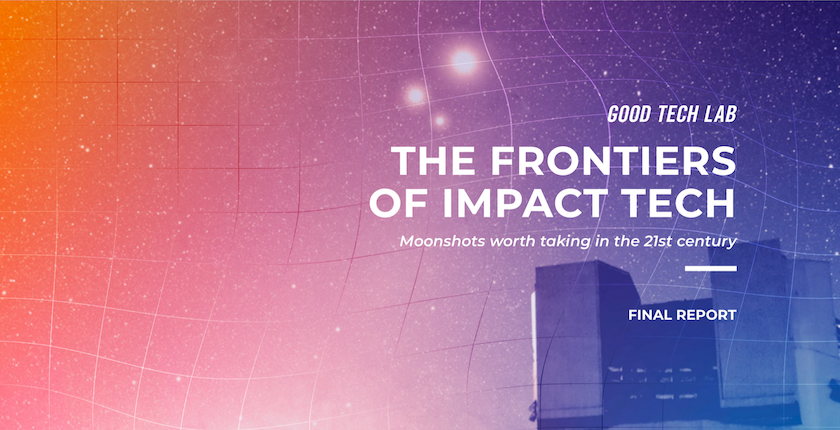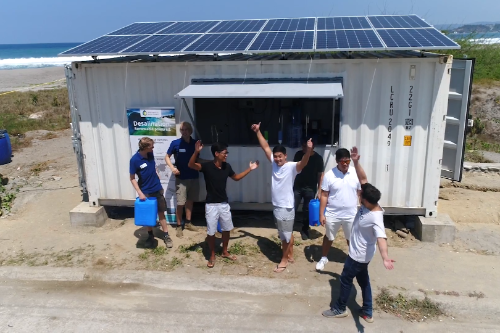News - June 27, 2019
Can technology help reverse climate change? Dive in Good Tech Lab’s new report on the Impact Tech movement


Written by Tristan Lebleu 4 min read
Good Tech Lab has decided to explore the frontiers of technology and system entrepreneurship and look at how innovation can help us fight the climate crisis.
After 18 months of research, comprising extensive desk research, interviews with 450 innovators and investors from 30 countries on 5 continents, Good Tech Lab, a research and innovation firm with offices in Paris and Barcelona, has launched a 220 page report which analyses how science, technology, and system entrepreneurship can help reverse climate change while ensuring people and nature thrive.
The Solar Impulse Foundation is proud to have contributed to this effort, as the result is one of the most comprehensive publications on the Impact Tech movement so far.
The report stresses that “fifty years after humans set foot on the moon, the future of our very existence depends on an even more ambitious moonshot — reversing climate change while ensuring people and nature thrive”. This message resonates deeply with Bertrand Piccard’s vision that humanity’s new challenge is not anymore to conquer the moon, but to conquer quality of life on Earth.
Impact Tech startups panorama
The report features 180+ ways that Impact Tech can help advance the United Nations’ Global Goals and keep human activity within the planetary boundaries, a concept which “presents a set of nine planetary boundaries within which humanity can continue to develop and thrive for generations to come”. These technological and scientific solutions span from bio-based chemicals to animal-free meat, zero-emissions transportation, secure land registries that empower smallholder farmers in the developing world, mobile money for financial inclusion, and satellite imagery preventing human trafficking.
Moreover, each of the innovation areas is illustrated with several companies and projects, including the following 11 Solar Impulse Efficient Solutions:
A massive economic opportunity
Good Tech Lab’s research is also a new proof that addressing global challenges will non only allow future generations to thrive but also create tremendous economic value. “Estimates find SDG solutions represent a $12 Trillion annual market and 380 million new jobs by 2030, while the removal of 1000 gigatons of CO2 from the atmosphere could create a $45 Trillion net financial gain by 2050”.
The importance of impact reporting
As the report finds out, “with growing expectations from customers, investors, government and civil society, impact reports are quickly becoming strategic in the private sector”. This is precisely the goal of labels and certifications, which “offer a simple way to communicate the impacts that a product or a company creates—be it positive outcomes or a reduced footprint. Certification processes vary in length and cost and can represent a sizeable investment. However, respected labels allow differentiation and can help attract talent, investors, and customers”. Good Tech Lab mentions a number of labels and certificates such as the B Corp certification, EnergyStar for energy efficiency, LEED for green buildings, FSC for sustainable forestry, Max Havelaar for fair trade, or Rainforest Alliance for sustainable agriculture… And last but not least, the Solar Impulse Efficient Solution Label!
Growing the Impact Tech movement
Finally, the report outlines 12 priorities to maximize the potential of Impact Tech in the next decade and scale the movement. These priorities include “expanding the talent pool and the availability of funding for Impact Tech, mainstreaming systems thinking and impact management in science and technology, embracing diversity and multi-stakeholders partnerships, strengthening incubation and acceleration, and mission-driven innovation policy”.
So, can technology reverse climate change? What is quite obvious as the conclusion of the report is that science, technology, and system entrepreneurship will play a crucial role in helping us decarbonize our energy, build more efficient and resilient infrastructures, transition to a circular economy, develop a more sustainable food production system, and ensure a just transition.
Want to get a big picture of how science and technology can help address the world's biggest challenges?
Download THE report

Written by Tristan Lebleu on June 27, 2019


















